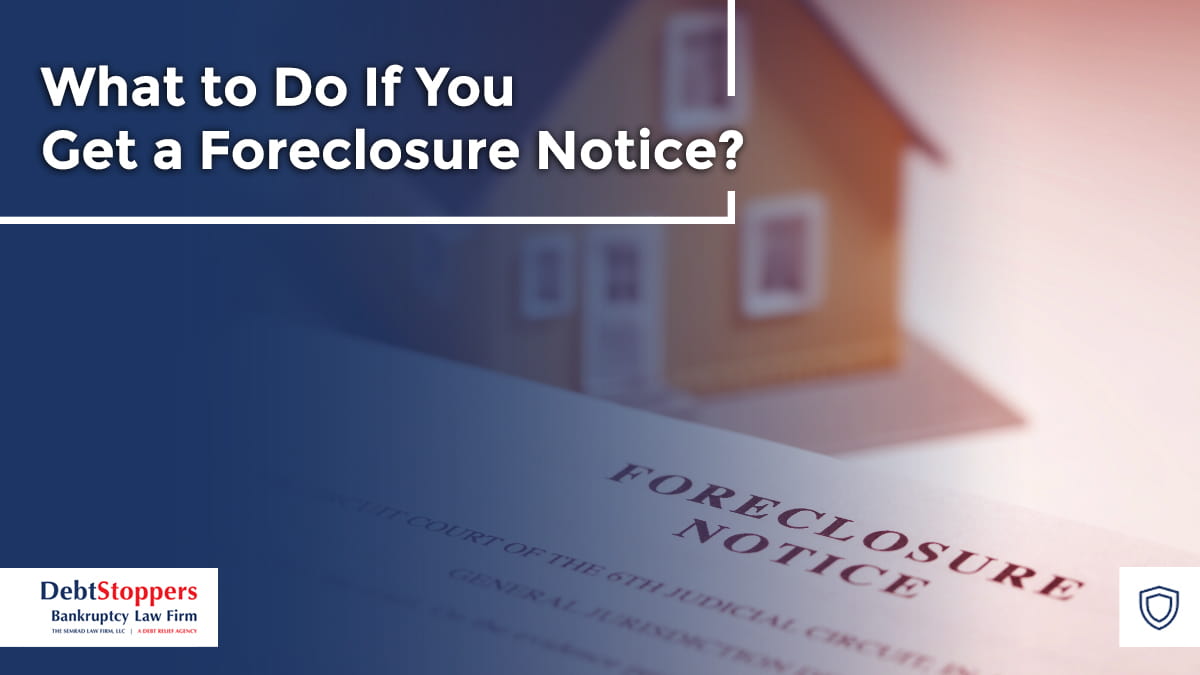What to Do If You Get a Foreclosure Notice?

Receiving a foreclosure notice can be an overwhelming and emotional experience. The thought of losing your home can be an overwhelming and emotional experience. People often feel panicked, especially if they are unsure of their rights and what they should do next.
A foreclosure notice is the beginning of a legal process, but it’s important to know that you have several opportunities to protect your home and explore alternative solutions. Acting quickly and understanding your options can make all the difference in saving your home and protecting your financial future.
What does a foreclosure notice look like?
A foreclosure notice may vary in appearance depending on the state where you live, the lender, and the stage of the foreclosure process. Typically, the notice will include your name, property address, the amount past due, and a warning that your mortgage is in default.
It may be labeled as a "Notice of Default," "Notice of Intent to Foreclose," or "Notice of Acceleration." You may receive this notice by certified mail, regular mail, or even have it posted on your door.
It’s important to know that these documents often come with a deadline by which you must act to prevent further legal action. This can include catching up on missed payments, applying for loss mitigation, or responding in court.

What happens when you get a foreclosure notice?
Once you receive a foreclosure notice, you should act quickly. The foreclosure notice is a formal indication that your lender has started the foreclosure process. Understanding what happens when you get a foreclosure notice can help you prepare and respond effectively.
Formal notice
The first step in most foreclosure proceedings is the formal notice from your lender. This is not just a warning, it is an official legal document. Depending on your state, this may come in the form of a judicial or non-judicial foreclosure notice. In some states, the lender must file a lawsuit in court, but in other states, the process occurs outside of the courtroom but still follows strict legal procedures. For example, Illinois is a judicial state, while Georgia and Texas are nonjudicial states.
The formal foreclosure notice typically outlines your total arrears, fees, and a timeline for resolving the debt or facing further legal action. The sooner you respond, the better your chances of resolving the situation without losing your home.
"Cure" Period
Most states provide a “cure” period, which is an opportunity to catch up on missed payments and bring your loan current. This period typically ranges from 20 to 90 days, depending on state laws and the terms of your mortgage agreement.
During this time, you may be able to negotiate a payment plan, apply for a loan modification, or explore other relief options such as forbearance. However, it is important to act quickly during the cure period because once it expires, the lender can move forward with the foreclosure process.
Foreclosure process goes on
If you do not act within the cure period, the foreclosure process continues. In judicial states, like Illinois, your lender will request a court judgment to sell your property. In non-judicial states, like Georgia and Texas, a trustee may proceed with scheduling a public auction. Once your home is sold at auction, you may be evicted, and the proceeds from the auction will be applied to your outstanding mortgage balance.
It’s also important to know that in some states, the lender may be able to pursue a deficiency judgment against you for the remaining balance if the home doesn’t cover the full amount owed.
Impact on credit score
Foreclosure has a significant negative impact on your credit score. Once a foreclosure is reported, your score can drop by 100 points or more, depending on your overall credit profile.
The foreclosure will remain on your credit report for seven years, making it more difficult to obtain loans, credit cards, or even rent an apartment in the future.
However, if you act early, you may be able to avoid foreclosure altogether by working with your lender or seeking legal assistance.

What to do if you get a foreclosure notice?
If you receive a foreclosure notice, please do not ignore it. Time is critical, and the faster you act, the more options you will have.
Contact your lender
After you receive a foreclosure notice, you should first reach out to your lender or loan servicer as soon as possible. Many lenders have loss mitigation departments that are specifically tasked with helping homeowners avoid foreclosure. You may be eligible for a loan modification, repayment plan, forbearance, or other alternatives based on your financial circumstances.
When you reach out to your lender, you should be prepared to provide documentation, including proof of income, hardship letters, and a list of monthly expenses. The sooner you contact the lender, the more options you will have.
Consult with a foreclosure attorney
Foreclosure laws vary by state, and the legal process can be complex. A foreclosure attorney can help you understand your rights, respond to legal filings, and represent your interests in negotiations or court proceedings. In some cases, legal representation may even result in a delay or dismissal of the foreclosure.
If you are also dealing with other types of debt, such as credit cards, medical bills, or back taxes, your attorney can help you explore whether bankruptcy may be a strategic option to stop the foreclosure and restructure your debts.
Consider your options
It’s wise to explore all available options before making any decisions. If you are unsure of your options, an experienced foreclosure attorney can help you assess your situation and find a solution that works for you.
One potential path is a loan modification, which may allow you to restructure your mortgage terms if you can demonstrate financial hardship. With a loan modification, your lender might agree to extend the repayment period, reduce the interest rate, or add missed payments to the back of the loan, making monthly payments more affordable.
Refinancing is another option, particularly if you still have reasonable credit and some equity in your home. By refinancing through a new lender, you may be able to secure better loan terms and regain financial stability. However, this route typically requires you to meet specific credit and income qualifications.
If keeping your home is no longer feasible, a short sale may be appropriate. With your lender’s approval, you can sell the property for less than what you owe on the mortgage. While it may not fully satisfy the loan, it can help you avoid the more damaging effects of foreclosure on your credit.
Alternatively, some homeowners pursue a deed in lieu of foreclosure, which allows the lender to take ownership of the property voluntarily; in return, the lender may forgive the outstanding mortgage balance, which allows you to get out of your mortgage without going through a full foreclosure process.
In some cases, people may want to consider bankruptcy because it offers significant legal protections and a structured path to financial recovery. Filing for Chapter 13 bankruptcy can immediately stop foreclosure through an automatic stay and enable you to catch up on missed payments over time under a court-approved repayment plan. Chapter 7 bankruptcy, while it does not offer a repayment structure, may discharge unsecured debts and free up money that can help cover your mortgage.
Each option comes with benefits and potential drawbacks, and consulting with a foreclosure attorney can help you determine which option is best for your situation. If you are facing foreclosure, it’s important to know that you have rights, options, and opportunities to protect your home and financial future.





